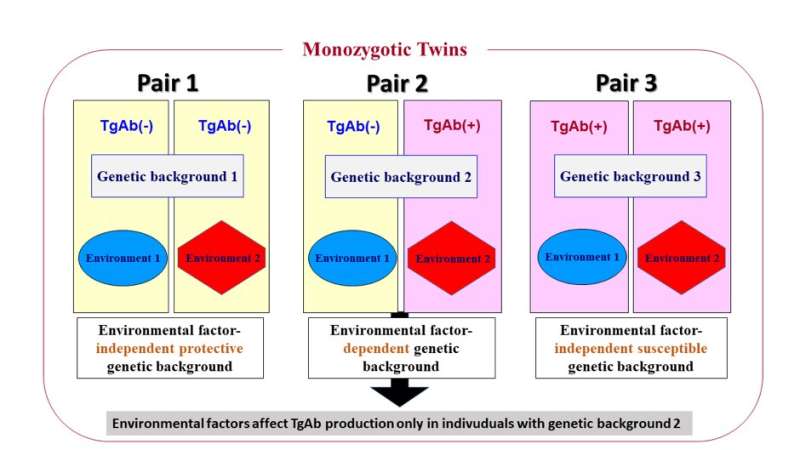Immune diseases inflict identical twins differently

Any parent with identical twins knows their two children are actually remarkably different. Identical twins are genetically identical, but they are not identical in gene expressions, a difference attributable to epigenetics. Epigenetics also makes twins different in their susceptibility to disease. A new study by researchers at the Osaka University Graduate School of Medicine reports which epigenetic factors in certain chromosomes make twins more or less at risk for autoimmune thyroid diseases. The study was published in Thyroid.
The thyroid is one of the body's critical centers for hormone production. It has a fundamental role in the body's metabolism and other functions such as sleep and menstruation. Abnormalities in the thyroid are associated with an assortment of diseases, including autoimmune thyroid diseases, such as Grave's disease and Hashimoto's disease. In these diseases, the body produces anti-thyroglobulin autoantibodies that cause the immune system to attack the patient.
Associate Professor Watanabe is researching new diagnostics by studying the epigenome of identical twins. Working with the Center for Twin Research at Osaka University, his group found 23 identical twins that were discordant for the production of anti-thyroglobulin autoantibodies and sought to find the genetic and epigenetic causes.
"We hypothesized there are differences in the methylation of CpG sites. The methylation of CpG sites regulates gene expressions. Some diseases like type 1 diabetes show abnormal methylation patterns," says Watanabe.
The methylation of CpG sites is a fundamental form of epigenetic regulation that occurs throughout the body. Indeed, his team found the methylation of CpG sites differed in the discordant pairs with the particular genotypes of 4 polymorphisms.
"The chromosomes containing these polymorphisms were not the same as the chromosomes containing genes associated with the susceptibility of autoimmune thyroid diseases. The genes susceptible to genetic factors and epigenetic factors are different," Watanabe explains.
He says the study demonstrates the complexity in diagnosing metabolic diseases like thyroid disorders.
"Looking at only the genes is not enough. We need to study the genetics and epigenetics to determine the risk."
More information: Mikio Watanabe et al, Genotype-based epigenetic differences in monozygotic twins discordant for positive anti-thyroglobulin autoantibodies, Thyroid (2017). DOI: 10.1089/thy.2017.0273

















